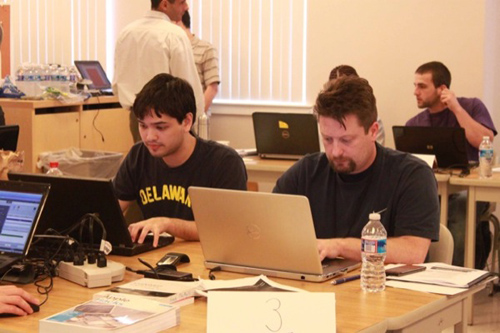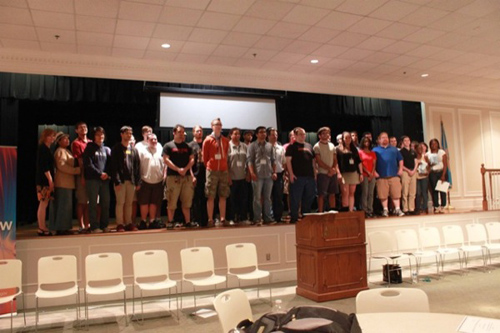US Cyber Challenge puts UD student on fast track to outwitting hackers
“Cryptography enables you to send secret code and hide information within a network to keep it secure,” Billy Bednar, a University of Delaware senior, told U.S. Sen. Tom Carper during a conference call Wednesday, July 18.
Carper, who is chairman of the Senate Homeland Security and Governmental Affairs Committee, is working to help safeguard the nation’s cyber space. To accomplish this he will need to rely on today’s leading experts, but also ensure that future cyber sleuths currently in the pipeline have the proper training to meet emerging cyber challenges.
Bednar, who lives in Landsdale, Pa., and is majoring in electrical and computer engineering at UD, is just the kind of young adult Carper is keeping his eye on. Last week, Bednar participated in Delaware’s annual U.S. Cyber Challenge camp, earning the top individual score in the camp’s “Capture the Flag” competition — where students defend their computer networks against hackers and real life security scenarios — and distinguishing himself among Delaware’s brightest cyber minds.
“In order to address the growing cyber security challenges facing our increasingly technology dependent society, we must focus on encouraging the next generation of Americans to develop the technology skills necessary to defend our country in this emerging battlefield,” said Carper, who spoke to Bednar from his Washington, D.C., office.
“I’m proud of the students, like Billy, who are participating in this year’s U.S. Cyber Challenge. The skills they are learning and honing during this week-long camp will give them, and our country, a leg-up on our competition,” said Carper.

UD’s Billy Bednar (left) at work during the U.S. Cyber Challenge “Capture the Flag” competition. Photos courtesy of Wilmington University/Dana Hufe, photographer
Now in its fourth year, the camp plays an important role in training students to outwit hackers that threaten the nation’s information security.
Over 45 talented students from Delaware Technical Community College, Delaware State University, the University of Delaware and Wilmington University participated in the camp, hosted on Wilmington University’s campus July 8-12.
The students attended in-depth training workshops on a range of topics, including penetration testing, reverse engineering and forensics, all taught by college faculty, SANS Institute senior instructors and other cyber security experts.
A team from Delaware State University took first place overall in the “Capture the Flag” competition. The winning team included Andrew Hobbs of Ocean City, Md.; Ainiah Floyd of Barnegat, N.J.; Priscilla Wilson of Dover, Del.; Trevor Newell of Dover, Del.; Emlyne Forren of Wenonah, N.J.
During the closing ceremonies, Delaware Secretary of Education Mark Murphy encouraged the students to continue learning, pointing to a recent Georgetown University study that indicates 22,000 STEM related jobs will be available in Delaware over next six years.
Kenneth Barner, chair of the Department of Electrical and Computer Engineering, called the U.S. Cyber Challenge competition the “perfect complement” to the growing cyber security research and education programs developing at UD.

Delaware’s U.S. Cyber Challenge campers. Photos courtesy of Wilmington University/Dana Hufe, photographer
The University offered its first cyber security course on the Newark campus in spring 2013. Funded through a National Science Foundation grant and support from JPMorgan Chase, the course addressed the foundation of computer and network security, covering pertinent topics in cryptography, secure systems and security fundamentals, including policy and access control models.
Student interest in the class exceeded the number of spaces available, confirming to Barner the need for this type of educational training.
Bednar, who was among the students in the course taught by UD senior scientist Chase Cotton, said the class combined his dual interests in electronics and security and led him to attend the U.S. Cyber Challenge. At the camp, he said he found the career fair particularly helpful because it opened his eyes to future career paths available to him. He said he could see a possible career path in “network security with a company such as PJM Interconnect,” a regional transmission organization focused on stabilizing the electrical grid.
Other cyber security-related courses being developed at UD, according to Barner, include secure program design, web security, digital forensics, penetration testing, reverse engineering, and ethical hacking, cloud security and coding theory and cryptography.
“Our goal is to help the nation build a pipeline of graduates skilled in the theories and practices required to successfully respond to real life security threats. Addressing these challenges is a regional and national priority — one that is likely to be at the forefront for many decades,” Barner said.
About the U.S. Cyber Challenge
The U.S. Cyber Challenge mission is to reduce the shortage in the cyber workforce by serving as the premier program to identify, attract, recruit and place the next generation of cyber security professionals.
– Article by Karen B. Roberts
*Source: University of Delaware
